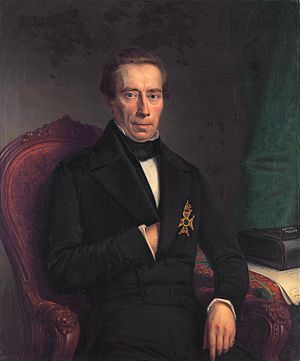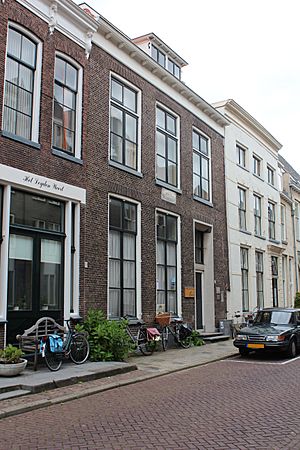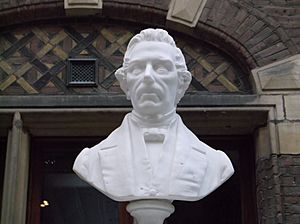Johan Rudolph Thorbecke facts for kids
Quick facts for kids
Johan Rudolph Thorbecke
|
|
|---|---|

Portrait by Johan Heinrich Neuman, 1852
|
|
| Prime Minister of the Netherlands | |
| In office 4 January 1871 – 4 June 1872 |
|
| Monarch | William III |
| Preceded by | Pieter Philip van Bosse |
| Succeeded by | Gerrit de Vries |
| In office 1 February 1862 – 10 February 1866 |
|
| Monarch | William III |
| Preceded by | Schelto van Heemstra |
| Succeeded by | Isaäc Dignus Fransen van de Putte |
| In office 1 November 1849 – 19 April 1853 |
|
| Monarch | William III |
| Preceded by | Jacob de Kempenaer |
| Succeeded by | Floris Adriaan van Hall |
| Minister of the Interior | |
| In office 4 January 1871 – 4 June 1872 |
|
| Preceded by | Cornelis Fock |
| Succeeded by | Pieter Philip van Bosse |
| In office 1 February 1862 – 10 February 1866 |
|
| Preceded by | Schelto van Heemstra |
| Succeeded by | Johan Herman Geertsema Carelszoon |
| In office 1 November 1849 – 19 April 1853 |
|
| Preceded by | Jacob de Kempenaer |
| Succeeded by | Gerlach Cornelis Joannes van Reenen |
| Member of the House of Representatives | |
| In office 25 February 1868 – 4 January 1871 |
|
| In office 19 November 1866 – 3 January 1868 |
|
| In office 14 March 1866 – 1 October 1866 |
|
| In office 27 June 1853 – 31 January 1862 |
|
| In office 17 October 1848 – 31 October 1849 |
|
| In office 21 May 1844 – 19 October 1845 |
|
| Personal details | |
| Born |
Johan Rudolph Thorbecke
14 January 1798 Zwolle, Batavian Republic |
| Died | 4 June 1872 (aged 74) The Hague, Netherlands |
| Nationality | Dutch |
| Spouse | Adelheid Solger (m. 1836–1870; her death) |
| Children | 4 sons and 2 daughters |
| Alma mater | Leiden University |
| Occupation | |
| Signature | |
Johan Rudolph Thorbecke (born January 14, 1798 – died June 4, 1872) was a very important Dutch politician in the 1800s. He was a liberal leader. He is most famous for helping to write a new Dutch Constitution in 1848. This happened during a time when many parts of Europe were having revolutions for more freedom. The new constitution changed the Netherlands from a country where the king had all the power (an absolute monarchy) to a constitutional monarchy. This meant the king's power was limited, and groups like the parliament and the government ministers became more powerful. The new constitution also gave more rights to people living in the Netherlands. Because of his work, Thorbecke is often called a founding father of the modern Dutch political system.
Contents
Growing Up and Learning
Johan Rudolph Thorbecke was born in Zwolle, a city in the Netherlands. His father, Frederik Willem, made tobacco, and his mother, Christine Regina, was from Germany. His father's business struggled because of French rules against British trade, and it went bankrupt in 1803. After this, his father spent a lot of time teaching Johan Rudolph and his younger brother.
Johan Rudolph was a very smart and curious child. His parents made sacrifices so he could get a good education, even though they had money problems. He went to primary school in Zwolle and Amsterdam. Later, he attended a Latin school in Zwolle until 1814. He then studied classical literature and philosophy in Amsterdam and Leiden. He finished his studies in Leiden in 1820.
Travels and Early Writings
After finishing his studies, Thorbecke received a scholarship to travel through Germany for four years. He even taught as a professor for a short time at the University of Giessen. During his travels, he learned about different ways of thinking, like historism and Romanticism.
When he returned to the Netherlands in 1824, he wrote his first important political book. It was called Bedenkingen aangaande het Regt en Den Staat, which means "Concerns about the Law and the State." This book got a lot of attention. The next year, he became a professor of Political Science at Ghent University. However, he had to leave this job in 1830 because of the Belgian Revolution.
In 1831, Thorbecke became a professor at Leiden University. His students thought he was very smart but also a bit distant.
Changing Political Views
At first, Thorbecke supported the conservative government of King William I. But throughout the 1830s, he started to disagree with the government's way of ruling. He began to believe that the country needed big changes to its constitution.
He wrote several essays about this, starting in 1839. In these writings, he argued for more constitutional reform. In 1844, he wrote Over het hedendaags staatsburgerschap ("On contemporary citizenship"). In this essay, he suggested that everyone should eventually have the right to vote.
Political Career Highlights
- Further information: Constitutional Reform of 1848
On May 21, 1844, Thorbecke was elected to the House of Representatives (part of the Dutch parliament). He quickly became the leader of the liberal group that wanted changes. In 1844, he and eight other members tried to change the constitution, but they were not successful at that time.
The 1848 Constitution
Four years later, in 1848, many parts of Europe were having revolutions. King William II of the Netherlands agreed to form a committee to rewrite the constitution. Thorbecke was chosen to lead this important committee on March 17.
Most of the changes in the new constitution were based on Thorbecke's ideas. The parliament approved the new constitution, and it was officially announced on November 3, 1848. This new constitution gave people more civil rights. It also made the parliament more powerful and introduced direct elections for members of the House of Representatives. Most importantly, it made government ministers responsible to the parliament, not just the King. This turned the Netherlands into a full constitutional monarchy, where the King's power was limited by law.
First Term as Prime Minister
Even though King William III was not very keen on Thorbecke at first, he appointed him to form a new government in October 1849. Thorbecke's first cabinet (group of ministers) started on November 13. In this government, Thorbecke was the Minister of the Interior and led the Council of Ministers. This made him the de facto Prime Minister of the Netherlands.
During his first term, Thorbecke's government passed several important laws. These included laws about elections and how provinces and municipalities (local governments) should be run. However, some people resisted his changes, and he was criticized for being a bit proud and for not getting along well with the King.
In 1853, there was a disagreement when the Catholic Church wanted to bring back its old system of bishops in the Netherlands. Many people, especially Protestants, were against this. This event was called the Aprilbeweging ("April Movement"). Thorbecke believed in the separation of church and state (meaning the government should not interfere with religious matters). Because he stayed neutral, some people accused him of supporting Catholics, and he was forced to resign from his position.
Leader of the Opposition
After resigning, Thorbecke spent nine years as the leader of the opposition in the House of Representatives. He argued for the Netherlands to remain neutral during the Crimean War in 1854. He also disagreed with parts of the Primary Education Act in 1857, especially those related to religion in schools.
Second Term as Prime Minister
In 1862, the government collapsed, and Thorbecke returned to power. On January 31, 1862, he began his second term as Minister of the Interior and chairman of the Council of Ministers. His relationship with the King had improved because Thorbecke's new reforms focused more on the economy than on politics. His government lasted four years, partly because he had the support of Catholic politicians.
One of his first actions in his second term was to remove government departments that dealt with religious affairs. Other important achievements included building new canals, passing laws about healthcare, and reforming local taxes in 1865.
Education Reform
A major achievement was the Secondary Education Act in May 1863. This law created a new type of school called the Hogere Burgerschool (HBS). This school provided education to hundreds of thousands of students between 1864 and 1974. Later, in 1968, the HBS was replaced by school types like HAVO and atheneum, which are still used today. This education reform is considered one of his greatest successes.
Thorbecke's second government ended on February 10, 1866, after a disagreement about criminal law in the Dutch East Indies (now Indonesia).
Final Years and Legacy
Thorbecke again became the leader of the opposition in parliament. In 1868, he helped form a new government, but he did not join it himself. Three years later, after that government also collapsed, the 73-year-old Thorbecke started his third term as Prime Minister. However, in December 1871, he became ill and never fully recovered. Johan Rudolph Thorbecke died at his home in The Hague on June 4, 1872, at the age of 74.
Even though some people disliked him because he was not a man who easily made compromises, Thorbecke is now seen as a very important figure in Dutch parliamentary history. There are three statues of him in the Netherlands (in Amsterdam, The Hague, and Zwolle), and a room in the Dutch parliament building is named after him.
Thorbecke wrote many articles about history and also newspaper articles about current events. He also published a study on the philosophy of history. All of his speeches in parliament have been published.
See also
 In Spanish: Johan Rudolf Thorbecke para niños
In Spanish: Johan Rudolf Thorbecke para niños
 | Isaac Myers |
 | D. Hamilton Jackson |
 | A. Philip Randolph |



